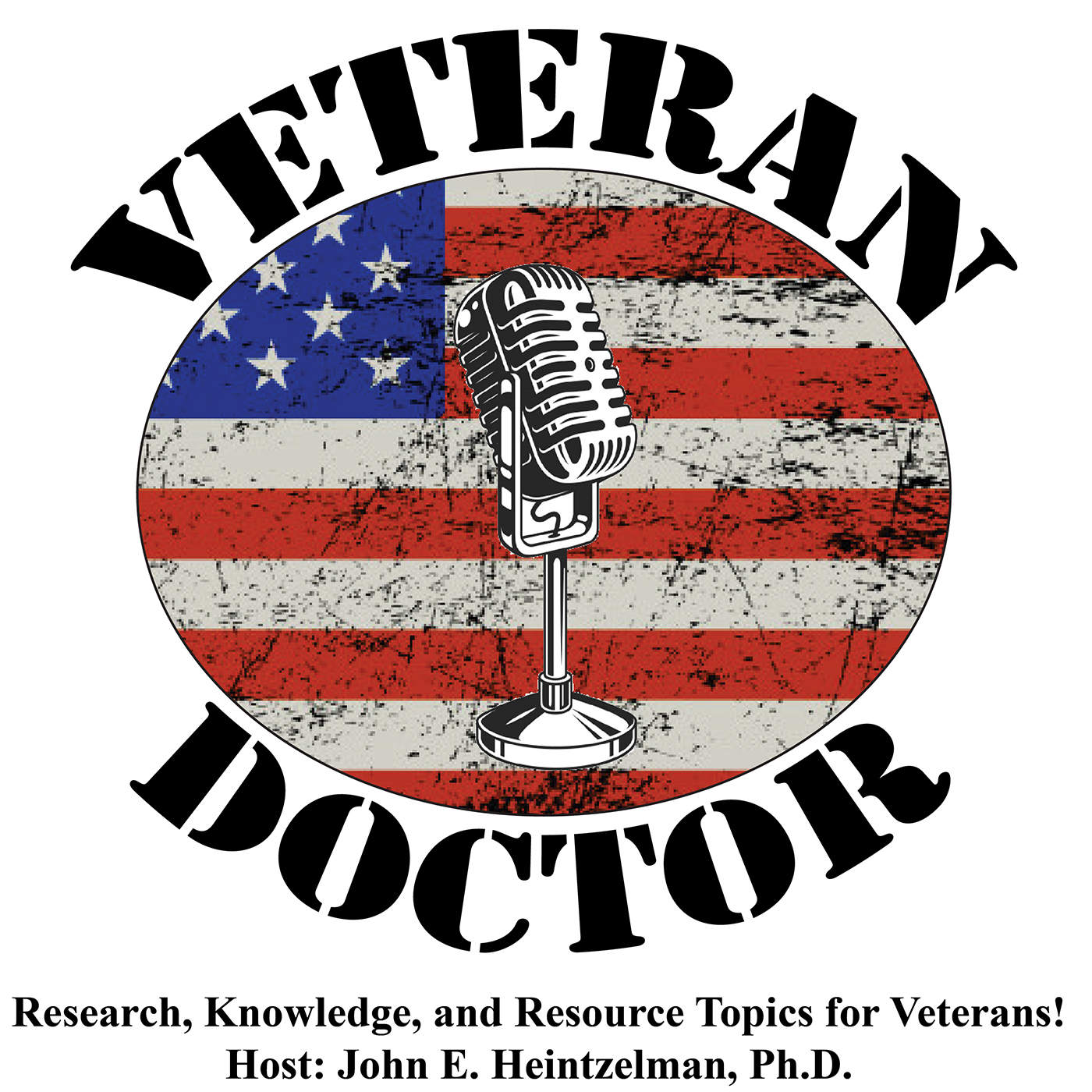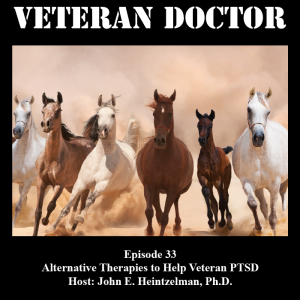
1.7K
Downloads
40
Episodes
This podcast is for anyone interested in Veteran-centric topics. Veterans have dedicated their lives to serving our country, so now it is our turn to serve them as they transition back into their civilian lives. One thing that has been discovered is that there is a lack of knowledge on the availability of resources and how to properly navigate the system upon exiting military service. This podcast's purpose is to help fill this gap of knowledge and guide veterans to the resources and information that they so deserve.
Episodes

Saturday Apr 15, 2023
Veteran Doctor - Episode 33 - Alternative Therapies to Help Veteran PTSD
Saturday Apr 15, 2023
Saturday Apr 15, 2023
Welcome to the Veteran Doctor Podcast, where we explore alternative therapies for veterans experiencing PTSD. In today's episode, we'll discuss ten different therapies that show promise for helping those who have served our country cope with their symptoms. I'm your host, Doctor John Heintzelman, and let's get started.
Post-traumatic stress disorder, or PTSD, is a mental health condition triggered by experiencing or witnessing a traumatic event. Many veterans who have served in combat zones, disaster areas, or other high-stress situations may develop PTSD. While conventional treatments like medication and talk therapy can be effective, not all veterans respond well to these methods. That's why exploring alternative therapies is crucial to help our heroes find the healing they need.
The first alternative therapy we'll discuss is EMDR, which stands for Eye Movement Desensitization and Reprocessing. This form of psychotherapy helps individuals process traumatic memories and reduce the intensity of their emotional reactions. During an EMDR session, the therapist guides the veteran to recall the traumatic event while focusing on a moving object or light. The bilateral stimulation helps to reprocess the memory, allowing the individual to develop new associations and coping mechanisms.
Our second alternative therapy is Equine-Assisted Therapy. This approach involves working with horses to help veterans build trust, emotional regulation, and self-awareness. Horses are sensitive to human emotions and respond accordingly, providing veterans with real-time feedback on their feelings and behaviors. By forming a bond with the horse, veterans can work through their trauma and learn new ways to cope with stress and anxiety.
The third therapy is Acupuncture. This ancient Chinese practice involves inserting thin needles into specific points on the body to stimulate the nervous system and release endorphins. Research has shown that acupuncture can reduce symptoms of PTSD, including anxiety, depression, and sleep disturbances. By targeting these symptoms, veterans can experience relief and a better quality of life.
The fourth therapy we'll discuss is Art Therapy. This form of therapy encourages veterans to express their feelings and experiences through various art forms, such as painting, drawing, and sculpture. By engaging in creative activities, veterans can process and externalize their emotions, leading to a greater understanding of their trauma and a sense of empowerment.
Our fifth alternative therapy is Yoga and Mindfulness Meditation. Yoga combines physical postures, breathing exercises, and meditation to promote relaxation and mental clarity. Mindfulness meditation involves focusing one's attention on the present moment and observing thoughts and feelings without judgment. These practices can help veterans reduce symptoms of PTSD, including hyperarousal, intrusive thoughts, and emotional numbing.
Our sixth therapy is Virtual Reality Exposure Therapy, or VRET. This method uses virtual reality technology to recreate the traumatic event in a safe and controlled environment. Veterans are gradually exposed to the source of their trauma, allowing them to confront their fears and process their emotions with the guidance of a therapist. Over time, this can help reduce the intensity of their PTSD symptoms and improve their overall mental health.
The seventh therapy is Neurofeedback. Also known as EEG biofeedback, this approach involves monitoring brainwave activity and providing real-time feedback to the individual. Veterans learn to regulate their brainwave patterns, which can help improve symptoms like anxiety, depression, and sleep disturbances. By gaining better control over their brain's activity, they can experience a greater sense of well-being.
Our eighth therapy is Emotional Freedom Technique, or EFT. This method, also known as "tapping," combines elements of cognitive therapy with acupressure. Veterans tap on specific points on their body while focusing on their traumatic memories and expressing their emotions. EFT can help release negative emotions, reduce stress, and promote healing from trauma.
The ninth therapy is Music Therapy. In this approach, veterans use music to express their emotions, explore their memories, and connect with others in a therapeutic setting. Music therapy can involve listening to music, creating music, or engaging in group activities like drumming circles. By engaging with music, veterans can experience emotional release, improved mood, and a greater sense of connection with others.
Our tenth and final therapy is Outdoor Adventure Therapy. This approach involves engaging in outdoor activities, such as hiking, rock climbing, or kayaking, to promote physical and mental well-being. Veterans can challenge themselves physically while also working on communication, teamwork, and problem-solving skills. Outdoor Adventure Therapy can provide a sense of accomplishment and empowerment while helping veterans cope with PTSD symptoms.
It's important to remember that not every therapy will work for every individual. Veterans should consult with their healthcare providers and explore different options to find the therapies that best suit their needs. It's also crucial to acknowledge that healing from PTSD can be a long and challenging process, but with the right support and resources, it is possible.
Thank you for joining us on the Veteran Doctor Podcast. We hope you found today's discussion on alternative therapies for veterans experiencing PTSD informative and inspiring. To learn more about these therapies and other resources available to veterans, visit our website at theveterandoctor.com. If you enjoyed this episode, please share it with someone who might benefit from it. Until next time, take care, and remember: healing is a journey, not a destination.

No comments yet. Be the first to say something!